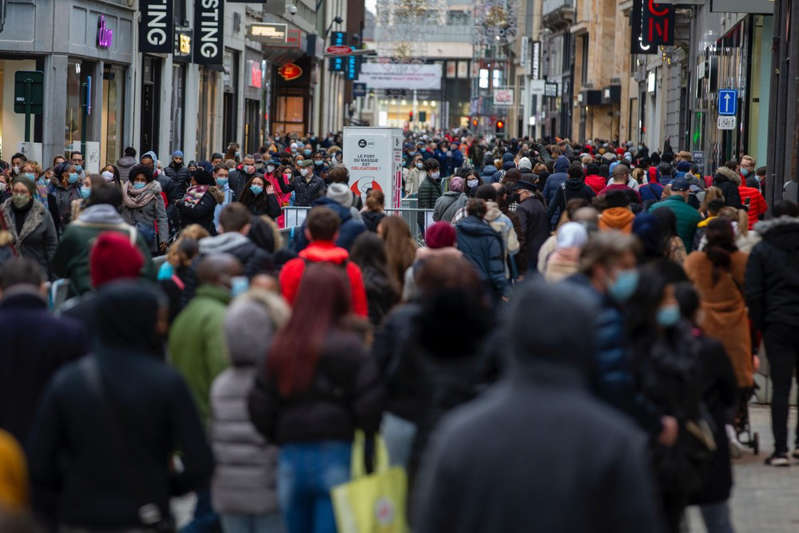With nearly 15,000 new Covid-19 cases confirmed on Monday, it is clear that "action is urgently needed" in all of Belgium, according to biostatistician Geert Molenberghs (UHasselt/KULeuven).
The Dutch Government is expected to announce a partial three week-lockdown on Friday evening to halt the rapidly rising infections, but Molenberghs doubts that such short-term, severe measures are the solution in Belgium.
"The question is whether such a short intervention will work, because what happens afterwards? There is something to be said for bearable, stable measures over the long term," he said on Flemish radio on Friday.
As it stands, the next Consultative Committee is scheduled for next Friday (19 November), but Interior Affairs Minister Annelies Verlinden already stated that the authorities could also meet sooner if the situation continues to worsen.
Related News
- Light festival in Ghent kicks off tonight
- Leuven cancels Christmas market citing Covid-19 risk
- More hospital beds closed as Covid-19 causes staff shortages
Molenberghs stressed that he does not want to point fingers at specific cities, but explained the "need to think carefully about mass events where lots of people come together." He added that events like the Light Festival in Ghent and the Christmas market in Brussels are "difficult to justify at this stage."
"Those events always result in gatherings where the virus spreads" Molenberghs added.
On Twitter, virologist Marc Van Ranst also drew attention to the large number of visitors flocking to the Light Festival in Ghent over the past few days. "As long as the visitors stay outside, I am not worried. But if they then enter less well-ventilated bars and stand shoulder to shoulder, a problem may arise."
Lichtfestival in Gent: Zolang de bezoekers buiten blijven, maak ik me geen zorgen, maar als ze daarna minder goed geventileerde cafés binnenstappen en daar schouder aan schouder gaan staan, kan er zich wel een probleem vormen.https://t.co/uSFOdmbsQP
— Marc Van Ranst (@vanranstmarc) November 12, 2021
"People see the rising numbers, so they also expect additional measures to be taken," Van Ranst clarified to the Belga News Agency. "It is delicate to name specific issues or sectors now. The government has a buffet of measures at its disposal: the composition of the final package will be important."
In the meantime, the organisers of the yearly Christmas market in Leuven announced that, for the second year in a row, the event would not take place due to high Covid-19 figures.
Meanwhile in Brussels, the "Winter Wonders" market is currently being constructed, but Molenberghs emphasised that "it would be a sensible measure not to let it take place now."
Acknowledging the disappointment this would bring, Molenberghs stressed that the number of patients in intensive care is rising and the regular non-Covid care is being postponed again. Yet again, this puts immense pressure on hospitals – which are closing beds due to staff shortages.
Covid death toll 'equivalent of seven flu seasons'
Speaking on the severity of the thread that Covid-19 continues to pose, Molenberghs asserted that the pandemic is not yet sufficiently under control to return to life as normal. "These are not conditions that make us think of a flu season, even a severe flu season," Molenberghs said.
"We are still at over 20 deaths a day. On a yearly basis, you are looking at 7,000 deaths. That is the equivalent of seven flu seasons."
The fact that the vaccination rate in Flanders is so high and the figures are still rising rapidly is possible because "we counted on the vaccines a little too much," Molenberghs thinks.
Still, Van Ranst pointed out that the current situation is only "somewhat bearable" because of the vaccines. "Without vaccinations, we would probably have had 200 to 300 deaths every day, partly due to the highly infectious Delta variant."
Molenberghs, too, stressed that the strength of the Delta variant is still being underestimated. "With the first variant (that set off the pandemic in Wuhan), the current vaccination coverage would have largely solved the problem," he said. "But now, the vaccination rate is not high enough."
Figures to continue rising
Several weeks ago, experts stated that they expected a new peak in infections in the autumn, but not in the hospital figures. "We will have to wait and see whether the figures continue to rise or whether this is a temporary peak, due to postponed tests after a holiday," Molenberghs said.
However, even if the number of infections starts dropping again, the hospitalisation rates will still continue to rise for some time. "Now, we are at 450 people in intensive care. I do not think we're going to be able to avoid 600."
By comparison, virologist Steven Van Gucht stated in the summer that he had hoped that Belgium would stay under 500 beds this time.
Over the course of last week, several experts and ministers have stressed the importance of following the current measures, particularly the wearing of a face mask and the recommendation to telework if possible.

